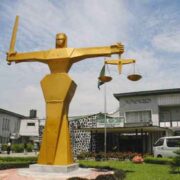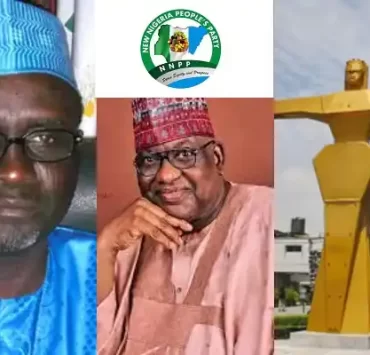20 CONSTITUTIONAL ISSUES EMBEDDED IN A LOCUS CLASSICUS CASE OF PRESIDENT, F.R.N V. NATIONAL ASSEMBLY.

Lawyard is a legal media and services platform that provides…
COURTESY: MORUFF O. BALOGUN, ESQ.
CASE: PRESIDENT, F.R.N V. NATIONAL ASSEMBLY [2023] 3 NWLR PT. 1870 PG 1-96.
PARTIES IN FULL:
THE PRESIDENT FEDERAL REPUBLIC OF NIGERIA
ATTORNEY-GENERAL OF THE FEDERATION
V.
1. NATIONAL ASSEMBLY
2. THE SPEAKER, RIVERS STATE
[Joined Pursuant to order of court of 19/05/2022].
FACTS:
Upon the presentation of the Electoral Bill 2022 to the plaintiff, the President of the Federal Republic of Nigeria, he assented to it and it became law, to wit, the Electoral Act, 2022.
Thereafter, the plaintiff sought to have section 84(12) of the Act removed or deleted on the ground that while giving his assent, he entered a caveat expressing reservations about the constitutionality and desirability of the said section 84(12) and followed same by writing a letter to the 1st defendant, the National Assembly, requesting it to cause the Electoral Act, 2022 to be amended to delete subsection (12) of section 84 of the Act.
Following the refusal of the 1st defendant to grant the request, the plaintiff commenced an action against the defendants in suit No. SC/CV/504/2022 at the Supreme Court by invoking the original jurisdiction of the Court.
Section 84(12) of the Electoral Act, 2022 provides:
“No political appointee at any level shall be a voting delegate or be voted
for at the Convention or Congress of any political party for the purpose of
the nomination of candidates for any election.”
The plaintiff sought the Court’s nullification of section 84(12) of the Electoral Act, 2022. It asserted that the section not only ignored section 84(3) of the Act, but jointly and severally stood in breach of sections 42(1) 65, 66, 106, 107, 131, 137, 177, 182, 192 and 196 of the 1999 Constitution as well.
Simply put, the case of the plaintiff was that section 84(12) of the Electoral Act, 2022 was unconstitutional, null and void, being discriminatory against political appointees and therefore violated the provisions of section 42(1) of the Constitution, the African Charter on Human and Peoples’ Rights, and the United Nations Declarations on Human Rights.
On their parts, the three defendants on record filed their respective counter-affidavit to the originating Summons. Furthermore, by their respective notice of preliminary objection and motion, they challenged the jurisdiction of the court to proceed on the plaintiff’s suit as constituted.
The grounds for their respective objections were that the requirements for the invocation of the original jurisdiction under Section 1(1) (A) of the Supreme Court (Additional Jurisdiction) Act, No. 3 of 2002 and Order 3 rule 6(1) of the Supreme Court
Rules 2014 did not exist. That only the Federation, States, President, National Assembly and State Houses of Assembly and no other person could be party in an originating suit before the Supreme Court.
That the presence of the 2nd defendant had removed the case from the compass of the provisions of section 1(1) (A) of the Supreme Court (Additional Jurisdiction) Act, and
placed it squarely within the jurisdiction of the Federal High Court, vide section 251 of the Constitution, and therefor in the circumstances, the court lacked the Jurisdiction to entertain the suit.
They contended further that the dispute giving rise to the suit was not justiciable and could not warrant the invocation of the additional original jurisdiction of the Supreme Court. Also that on 25th February 2022, the plaintiff signed the Electoral Bill 2022 into law, and could therefore not turn around to seek to strike down the amendment of the same by any means including through judicial process. That the plaintiff had no legal right to protect in the suit, no cause of action that the suit amounted to an abuse of court process.
In determining the suit, the Supreme Court considered the following statutory provisions.
Section 232(1) and (2) of the 1999 Constitution of the Federal Republic of Nigeria, 1999 (as amended):
“The Supreme Court shall, to the exclusion of any other court, have original jurisdiction in any dispute between the Federation and a State or between States if and in so far as that dispute involves any question (whether of law or fact) on which the existence or extent of a legal right depends.
In addition to the jurisdiction conferred upon it by Subsection (1) of this section, the Supreme Court shall have such original jurisdiction as may be conferred upon it by any Act of the National Assembly.”
Section 1(1)(A) of the Supreme Court (Additional Original Jurisdiction) Act, 2002 states:
“ In addition to the original jurisdiction conferred upon the Supreme Court of Nigeria by Section 232(1) of the 1999 Constitution, the Supreme Court shall to the exclusion of any other Courts, have original jurisdiction in any dispute between:-
The National Assembly and the President.
The National Assembly and any State House of Assembly, and
The National Assembly and any State of the Federation in so far as that dispute involves any question (whether of law or fact) which the existence or extent of a legal right depends.”
Held:
This was a preliminary objection and a motion by the defendants challenging the competence of the action of the 1st plaintiff commenced at the Supreme Court, in a unanimous decision, upheld the preliminary objection and motion and struck out the action of the plaintiffs.
On whether the holder of an office who participated in the making of a law can afterwards challenge constitutionality of same-
The holder of an office that participated in the making of a law, by virtue of his holding that office cannot afterwards, as holder of that office, challenge the constitutionality, correctness, justification or desirability of that law. As a participant in the making of the law, the holder of such office has reasonable opportunity to oppose the making of such law as constituted.
If the law is enacted in spite of his opposition to its making, he cannot afterwards invoke the judicial process to strike it down for any reason. In the instant case, the
plaintiff,as the President of the Federal Republic of Nigeria, participated in making the Electoral Act 2022 by virtue of section 58 of the 1999 Constitution (as amended) and could therefore not challenge the constitutionality of same.
On whether the 1999 Constitution makes exercise of legislative powers of the National Assembly subject to direction and control of the President-
There is no part of the 1999 Constitution that makes the exercise of the legislative powers of the National Assembly subject to the direction and control of the President of Nigeria. In the instant case, the 1st plaintiff’s written request to the National Assembly
to amend the Electoral Act 2022 by deleting section 84 (12) therein was a violation of section 4 (1) of the 1999 Constitution. The instant suit which was filed as a response to the refusal of the National Assembly to grant the said written request was an
employment of the judicial process to help realize the said violation.
On role of the President in making an Act-
The role of the President in making an Act of the National Assembly consists of his signification that he assents or that he withholds assent to the Bill, when both Houses of the National Assembly have passed the Bill and reached an agreement on any
amendment made on it and presented it to him for assent. He participates in making the Act by this role irrespective of whether he assents or withholds his assent. In the instant case, the 1st plaintiff assented to the Bill and it became an Act. He could not invoke the judicial process to challenge the constitutionality, validity, correctness, desirability, justification of the Act of the National Assembly which he participated in making.
On when the role of the President in law-making process ceases-
The role of the President in the law-making process ceases after his signification of assent or withholding of assent. In the instant case, the President assented and consented to what the two Houses of the National Assembly had done and presented to him and the Bill became law.
On role of the President after a law is made –
The only role the Constitution assigns to the President after a law is made is to comply with or enforce it. There is no room for him to exploit the power given to the courts by section 4(8) of the 1999 Constitution (as amended) to review the exercise of legislative powers by the National Assembly.
Per AGIM, J.S.C.
“ I agree with the argument of learned counsel for the 1st defendant that this suit by
the plaintiff is a reprobation of what the 1st plaintiff had approbated and that this cannot be allowed in law. Having assented to the Electoral Bill 2022 and thereby accepted that it becomes law, the plaintiff cannot bring this suit contending that the Act resulting from his assent is not constitutional, or desirable or justifiable, thereby retracting from his assent…”
On whether there is constitutional provision empowering the President to challenge the validity of an Act of the National Assembly and effect of his assent to such Act-
There is no provision of the Constitution that vests the president with the power to challenge the validity of an Act of the National Assembly that has come into being after his assent or after he had withheld his assent. Also, his assent to the enactment of the
said Act operates to estoppel him from challenging the Act as invalid for any reason.
On whether the President has constitutional power or right to request or compel the National Assembly to amend or make an Act-
The President has no constitutional or legal right or power to request or compel the National Assembly to amend or make an Act. No part of the Constitution gives him such right or power.
On procedures to amend or repeal perceived offensive law-
Where there is a perceived offensive law, as in the instant case, there are procedures and mechanisms available within the legislature for an amendment of such provision or an entire repeal of the law but not for another organ to interfere. In the instant case, the plaintiff had no power to interfere with the constitutional responsibilities of the 1st defendant or in any manner seek to influence the performance thereof.
On effect of assent to a Bill –
By virtue of section 58 of the 1999 Constitution (as amended), once there is an assent to a Bill, it signifies the acceptance and concurrence of the Presidency to the entirety of the Bill to become an Act of the National Assembly. In the instant case, having given his assent to the Bill, the plaintiff could not under any guise, turn around to invoke the judicial process to challenge the constitutionality, validity or otherwise of an Act of the National Assembly, duly made in the exercise of its legislative powers.
This was against the spirit and letter of section 4 of the 1999 Constitution (as amended).
On when a Bill is deemed an Act of the National Assembly-
By virtue of section 58 (1) & (5) of the 1999 Constitution (as amended), once a Bill passed by the National Assembly is duly assented to by the President, the Bill is deemed an Act of the National Assembly. In the instant case, the Electoral Act of
2022 became law on the very date the president assented (signed), to same on 25th February 2022.
On need to determine a challenge to court’s jurisdiction first and reason therefor-
A challenge to a court’s jurisdiction must necessarily be determined first. The procedure saves the time of both the court and the parties, since in the absence of the required jurisdiction, any decision eventually arrived at remains fruitless and unenforceable. The
issue of court’s jurisdiction is a threshold issue such that whenever it is raised, it must be addressed at the earliest opportunity because where a court lacks jurisdiction to entertain a matter, the entire proceedings no matter how well conducted is a nullity. Thus, where the issue of the competence or jurisdiction of a court of law to entertain/
adjudicate over a matter is raised by any of the parties, it should be considered and determined first before a consideration of other issues or other steps are taken in the proceedings.
On conditions upon which a court is competent to exercise jurisdiction-
The conditions on which a court is competent to exercise jurisdiction in relation to an action before it are as follows:-
it is properly constituted as regard numbers and qualifications of the members of the bench and no member is disqualified for one reason or another;
the subject matter of the case is within its jurisdiction and there is no feature in the case which prevents the court from exercising its jurisdiction; and
the case comes before the court initiated by due process of the law and upon fulfillment of any condition precedent to the exercise of jurisdiction.
In the instant case, by the combined effect of the 2nd and 3rd conditions, the jurisdiction of the court abated as the plaintiff failed to disclose a cause of action.
On dominance of doctrine of separation of powers between the three arms of government in the 1999 Constitution –
The doctrine of separation of powers between the three arms of government is very prominent in the 1999 Constitution. Section 4 vests the legislative powers of the Federal Republic of Nigeria in the National Assembly, section 5 vests the executive powers of the Federation in the President of the Federal Republic of Nigeria, while section 6 vests
the judicial powers of the Federation in the courts.
Their functions and responsibilities are clearly defined such that whereas the legislature makes the laws, the executive administers the laws so promulgated by the legislature, and the courts interpret the laws.
On where the legislative powers of the Federal Republic of Nigeria is vested –
By virtue of section 4(1) of the 1999 Constitution (as amended), the legislative powers of the Federal Republic of Nigeria shall be vested in a National Assembly for the Federation which shall consist of a Senate and House of Representatives. Nowhere in
section 4 of the Constitution, or any other provision of the Constitution, is the legislative power of the Federation vested in either the President or the court and vice versa. The constitutional responsibilities do not overlap from one organ to another.
On meaning of ‘assent’-
The word ‘assent’ denotes an agreement, approval, or permission, especially verbal or non-verbal conduct (action) reasonably interpreted (construed) as willingness (consent).
On whether the courts can be engaged in unconstitutional and illegal enterprise –
The courts cannot be engaged in unconstitutional and illegal enterprise. The instant suit was therefore an abusive use of the judicial process and the Court lacked the jurisdiction to entertain same.
On what the Constitution is founded-
The grundnorm itself, that is the 1999 Constitution (as amended), from which all other laws derive their validity, is fundamentally founded on the doctrine of the rule of law.
On whether doctrine of ‘filling the gap’ is permissible under the 1999 Constitution-
The doctrine of “filling the gap”, which advocates that in judicial activism, the court may fill in the gap where there is a lacuna in the statute, is not permissible under the 1999 Constitution.
On When a Bill shall become law without the assent of the President –
By virtue of section 58 (5) of the 1999 Constitution (as amended), where the President withholds his assent and the Bill is again passed by each House by two-thirds majority, the Bill shall become law and the assent of the President shall not be required.
Per SAULAWA, J.S.C. said:
“The above provisions of section 58 of the 1999 Constitution are crystal clear, and rather unambiguous. The 1st plaintiff had exercised his constitutional power as President of the Federation by according his assent, thereby signing the Electoral Bill, 2022 into law (Electoral Act, 2022). Thus, having signed the said Bill in to law, it would be not only difficult but utterly impossible for him to now seek to undo what he had voluntarily done the signing of the said Electoral Bill, 2022 in to law (Electoral Act, 2022).”
On extent of the additional original jurisdiction of the Supreme Court-
By virtue of section 1(1)(A) of the Supreme Court (Additional Jurisdiction) Act 2002, in addition to the jurisdiction conferred upon the Supreme Court of Nigeria by section 232(1) of the 1999 Constitution, the Supreme Court shall, to the exclusion of any other court, have original jurisdiction in any dispute between –
the National Assembly and the President;
the National Assembly and any State House of Assembly; and
the National Assembly and the State of the Federation;
In so far as that dispute involves any question (whether of law or fact) on which the existence or extent of a legal right depends. In the instant case, the dispute did not involve any question on which the existence or extent of any legal right depended.
Therefore, the suit could not be entertained by the Supreme Court in exercise of its additional original jurisdiction under section 1(1)(A) of the Supreme Court (Additional Original Jurisdiction) Act, 2002.
Courtesy:
Moruff O. Balogun Esq.
Ijebu Ode, Ogun State.
08052871414
09121207712 [WHATSAPP]
Lawyard is a legal media and services platform that provides enlightenment and access to legal services to members of the public (individuals and businesses) while also availing lawyers of needed information on new trends and resources in various areas of practice.













